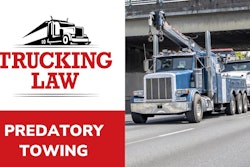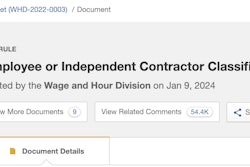Trucking news and briefs for Thursday, Feb. 15, 2024:
California lawmakers revive attempt to ban driverless trucks
Lawmakers in California are making another attempt to effectively ban driverless trucks on roads in the state.
Last year, the state legislature overwhelmingly passed a similar bill, but it was vetoed at the finish line by California Gov. Gavin Newsom.
The new bill was introduced Feb. 8 by California Assembly members Cecilia Aguilar-Curry, Laura Friedman and Ash Kalra.
It would ban the use of autonomous vehicles with a gross vehicle weight of 10,001 pounds or more on public roads without a human safety operator present in the vehicle.
“I’ve reintroduced this bill because the legislature’s role is critical in deciding when autonomous trucking is safe and when there is a real plan for our trucking workers,” said Aguiar-Curry. “The autonomous trucking industry has cast this bill as a ban on technology when it explicitly states that testing and deployment will happen with a Human Safety Operator. Using their logic, they’re the ones who support a ban. A ban on humans in trucks. A ban on working people’s ability to provide for their families and provide safe roadways for Californians. We will not stand by and let them put profits over people.”

A rally was held Monday outside the State Capitol in Sacramento to support the bill, attended by International Brotherhood of Teamsters leadership and lawmakers.
“As autonomous vehicle companies try to push their new, untested technology onto our roads, we need to prioritize legislation that will protect our streets and good-paying driving jobs, and that starts with AB 2286,” said Peter Finn, Teamsters International Western Region Vice President, President of Teamsters Joint Council 7.
Last year, when the similar bill ultimately vetoed by the governor was advancing through the state legislature, Overdrive readers signaled majority support for its approach, whether on safety (68%) or economic (11%) grounds.
[Related: Two states looking to ban driverless autonomous trucks]
FMCSA seeks driver input to aid Truck Leasing Task Force
The Federal Motor Carrier Safety Administration is asking for information from truck drivers to help the agency’s Truck Leasing Task Force (TLTF) identify terms and conditions in lease contracts that may be unfair to drivers.
FMCSA is specifically asking for driver input about leasing arrangements they have personally experienced or of which they have knowledge. FMCSA is particularly interested in hearing from truck drivers, lessors of CMVs, trucker organizations, social services organizations, consumer rights and advocacy organizations, plaintiffs’ attorneys, academics and researchers, representatives of labor organizations, and state and local government officials.
In a Federal Register notice to be published Friday, Feb. 16, FMCSA included lists of questions (at the bottom of the docket) for both lessees and lessors of commercial motor vehicles. The questions are examples of information the TLTF would find helpful in completing its task of examining and reviewing the terms, conditions and equitability of common truck leasing arrangements, particularly as they impact owner-operators and trucking businesses subject to such agreements.
Commenters are not required to answer every question and should not view the list as a constraint on sharing information with the agency and the task force, the agency added.
In addition to providing the information to the TLTF members, FMCSA will also share the information with the Consumer Financial Protection Bureau (CFPB), a U.S. government agency dedicated to making sure consumers are treated fairly by banks, lenders and other financial institutions. The DOT has named the CFPB as a technical advisor to the TLTF.
Comments are being accepted for 30 days from publication of the notice in the Federal Register -- through March 17. At its last meeting the TLTF expressed intent to hold its next meeting at the Mid-America Trucking Show to invite further public participation, though no details to that effect appeared in this information request.
[Related: Lease-purchase task force zeroes in on restrictive maintenance covenants]
Kenan Advantage Group entering dry bulk business with acquisition
Kenan Advantage Group has acquired Northern Dry Bulk, a Clare, Michigan-based company launched with one truck in 1994 that has grown markedly and now specializes primarily in the transportation and storage of plastic resins for automotive, packaging, electronic and other end markets, in the U.S. and Canada. Terms of the deal were not disclosed. The deal does not include a related plastics recycling operation.
The acquisition of Northern Dry Bulk is KAG's entrance into the dry bulk transportation business "and perfectly aligns with our strategic growth initiatives to expand into new end markets," said KAG Executive Vice President of Specialty Products John Rakoczy. "The transaction also fulfills the needs of many of our current liquid bulk customers who also manufacture and distribute dry bulk materials.”
Northern Dry Bulk drivers, technicians and operational support members will join KAG, which will also acquire 36 tractors, 91 trailers, two terminals with two maintenance bays, warehouse space and transloading capabilities to continue expanding its service offerings.
“In 1994, we started with one truck and a simple plan: to provide unmatched customer service,” said Tom Kunse, Northern Dry Bulk owner and president. “Over the years we have become one of the most respected leaders in deliveries of plastic resins in the chemical manufacturing industry. By joining forces with KAG, both of our current and future customers will benefit from our shared knowledge, geographic footprint, and assets in a marketplace positioned for significant growth opportunities."
[Related: ELS sells flatbed division to PS Logistics]










